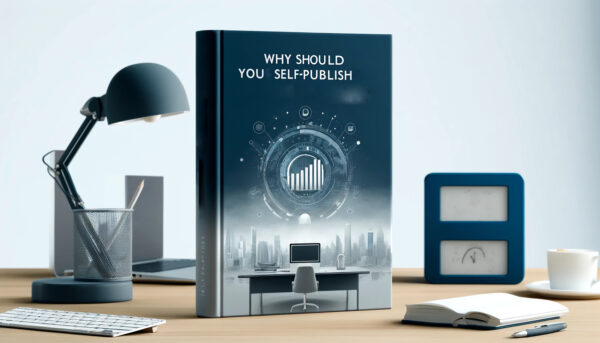The self-publishing landscape is undergoing a revolution, and it’s no longer powered by endless late nights or relying on pure luck. Enter artificial intelligence, your new writing companion, brainstorming partner, and marketing strategist. Just a few years ago, self-publishing felt like an overwhelming journey, but today, AI is transforming the process, helping authors move from concept to completion with ease.
From refining your prose to crafting high-quality content and even building your audience, AI tools are streamlining tasks that once took months. No more sleepless nights or overwhelming hurdles, AI makes self-publishing effortless, allowing you to focus on what truly matters: your creativity.
Let’s explore how AI is reshaping the self-publishing world and how you can harness these powerful tools to bring your book to life. Ready to get started? Let’s begin!
Introduction to AI in Self-Publishing
Artificial Intelligence (AI) is no longer a futuristic concept confined to sci-fi novels; it’s a powerful tool that’s transforming industries, including self-publishing. For authors navigating the complex world of self-publishing, AI tools offer a lifeline, simplifying tasks that once seemed insurmountable. From generating content to marketing your book, AI is revolutionizing the way authors bring their stories to life.
In the competitive publishing industry, standing out is crucial. AI tools can help you do just that by enhancing your writing process, improving the quality of your work, and streamlining your marketing efforts. Whether you’re a seasoned author or a newcomer, AI can make your self-publishing journey smoother and more efficient.
Overview of the self-publishing process and where AI tools fit in
The self-publishing process typically involves several key steps, each of which can be enhanced by AI tools:
- Writing and Editing: AI tools can assist with content generation, editing, and professional proofreading, streamlining the writing process and making it less daunting. With advanced book editing services, AI ensures your manuscript receives flawless finishing touches, helping to catch every error and refine your writing. Additionally, AI writing programs offer features like natural language processing and audience feedback insights, perfect for elevating your manuscript.
- Formatting and Design: AI tools can assist with professional formatting and designing your book, ensuring your text is optimized for various devices and platforms, giving it a polished, ready-to-publish look.
- Cover Design: AI tools can provide professional templates or generate stunning visuals based on genre trends, helping your book stand out with a visually striking and market-ready cover.
- Publishing and distribution: While AI tools may not directly handle publishing, they can assist with preparing your manuscript for various platforms.
- Marketing and Promotion: AI tools can assist with targeted marketing strategies, including keyword research, Amazon optimization, and social media advertising. By honing in on the right audience, AI helps you expand your reach and boost sales effectively.
By integrating AI tools into each stage of the self-publishing process, authors can save time, reduce costs, and improve the overall quality of their work.

Definition of AI Writing
AI writing refers to the use of artificial intelligence to generate high-quality written content, from blog posts and articles to social media updates and even full-length books. These AI tools use advanced technologies like natural language processing (NLP) and machine learning algorithms to analyze, understand, and mimic human language. The result? Content that feels natural and human-like, but is created in a fraction of the time.
Whether you’re crafting attention-grabbing social media posts or working on the next big novel, AI writing tools are here to help. They assist with everything from brainstorming and content creation to editing and proofreading. With AI, the writing process becomes smoother and more efficient, allowing you to focus on your creativity while leaving the heavy lifting to the technology.
AI writing isn’t just about convenience; it’s about making writing more accessible and less daunting. These tools help authors, marketers, and content creators alike save time, improve quality, and unlock new levels of productivity.
Common Concerns and Ethical Considerations
While AI writing tools bring exciting benefits, they also raise several important concerns and ethical questions:
- Misuse of AI-Generated Content: One major worry is the potential for AI-generated content to be used for spreading misinformation or propaganda. With the ability to quickly generate persuasive text, AI could be exploited to distort facts or manipulate public opinion.
- Job Displacement: As AI tools become more capable of handling writing tasks, there are concerns about the displacement of human writers. The rise of AI in content creation raises questions about the future of jobs in the writing industry and the value placed on human creativity.
- Devaluation of Human Creativity: With AI taking on more aspects of the writing process, some worry that this could lead to the devaluation of original, human-driven content, affecting the authenticity and emotional depth of writing.
- Authorship and Ownership: AI writing introduces complex ethical questions about who owns AI-generated content. Is it the writer who provides the prompts, or the creators of the AI tool? Establishing clear guidelines around authorship and ownership is essential.
- Transparency: Transparency is crucial when using AI tools in content creation. Readers and consumers should be informed when content is generated or heavily assisted by AI, ensuring the integrity of the writing process is maintained and ethical standards are upheld.
Choosing the Best AI Writing Tool and Using AI to Generate Book Ideas and Titles
With an abundance of AI writing tools available, choosing the right one can be overwhelming. Start by considering the type of content you want to create, whether it’s blog posts, marketing materials, or fiction. Tools like Grammarly and ProWritingAid excel in editing and proofreading, while Jasper and Sudowrite offer robust content-generation capabilities, including idea generation and title suggestions.
AI tools leverage advanced technologies like natural language processing (NLP) and machine learning to understand, mimic, and enhance human writing. For fiction writers, AI can assist in generating character profiles, plot twists, and entire storylines. For nonfiction authors, it can help with research, organizing ideas, and creating captivating titles and subtitles.
When selecting an AI writing tool, consider the following factors:
- Accuracy and Reliability: Look for tools that are proven to generate high-quality content, edit effectively, and format with precision. Check reviews and user feedback.
- Ease of Use: Choose tools that are user-friendly, with intuitive interfaces and tutorials, so you don’t need technical expertise to get started.
- Customization Options: Evaluate whether the tool offers features like tone, style, and genre customization, which can make your content more tailored to your voice.
- Integration: Does the tool work well with other software you use, such as writing programs or social media platforms? Seamless integration will help streamline your workflow.
- Cost and Value: Weigh the cost of the tool against its features, looking for good value within your budget.
Additionally, AI tools can assist with formatting and design. Programs like Vellum and Atticus help with book formatting, while marketing tools like Hootsuite and Buffer can assist with keyword research, Amazon optimization, and social media advertising, ensuring your book gets the attention it deserves.
By leveraging AI tools across writing, editing, formatting, and marketing, self-publishers can enhance their creative process, improve their content, and boost their chances of success in the competitive publishing landscape.
Your Publishing Journey Awaits – Start NowConducting Market Research with AI-Powered Tools
Market research is a crucial step in the self-publishing process, and AI-powered tools can help authors conduct research more efficiently and effectively. AI writing tools, such as Frase IO and Publisher Rocket, offer features like keyword research, market trend analysis, and competitor analysis.
These tools use NLP and machine learning algorithms to analyze large datasets, providing authors with valuable insights into their target audience, market trends, and competitor strategies.
For example, AI can help authors:
- Identify profitable keywords and categories on Amazon
- Analyze market trends and competitor strategies
- Understand their target audience’s preferences and behaviors
- Optimize their marketing materials and book descriptions
By leveraging AI to conduct market research, authors can:
- Increase their book’s visibility on online platforms
- Improve their marketing strategies and sales
- Understand their target audience better
- Make data-driven decisions in the publishing process
AI-Powered Tools for Editing, Content Creation, Design, and Marketing
AI tools are transforming the self-publishing journey, making everything from editing and content creation to marketing and design more efficient and effective.
Editing and Proofreading with AI
Editing can often feel like a never-ending task, but AI simplifies the process by flagging errors, suggesting style improvements, and enhancing clarity in real-time. Tools like ProWritingAid use natural language processing (NLP) to scan your manuscript, providing human-like suggestions for improving readability, grammar, and consistency. For fiction writers, AI programs like Claude offer tailored features for storytelling, character development, and prose refinement. Instead of spending hours (or days) catching every tiny error, authors can rely on AI to provide initial insights, turning even complex drafts into polished, professional work.
Content Creation: Short-Form and Long-Form
AI tools are versatile, capable of generating both short-form and long-form content with ease. For quick social media posts, platforms like Hootsuite and Buffer streamline content creation. When tackling larger projects, like blog posts or full-length books, tools such as Jasper and ProWritingAid offer robust capabilities, ensuring well-researched, compelling writing. Fiction writers can take advantage of specialized tools like Sudowrite and Claude, designed to help with everything from brainstorming ideas to crafting entire novels. Whether you’re drafting a tweet or a book, AI tools can enhance your writing and boost productivity.
Formatting and Design: Bringing Your Book to Life
Formatting and design, often seen as daunting tasks, are simplified with AI tools like Vellum and Atticus. These programs provide user-friendly interfaces to help ensure your book is perfectly formatted for various devices, from Kindle to Apple Books. When it comes to cover design, AI can generate templates or visuals based on current genre trends, ensuring your book stands out. AI tools even help you select the right fonts and color palettes, giving your book a polished, professional appearance that will captivate your audience.
Marketing and Promotion with AI
Marketing a self-published book can feel like a full-time job, but AI tools make it easier. From generating social media posts and blog content to crafting compelling book descriptions, AI content generators like Copy.ai can help you produce high-quality, keyword-optimized content. These tools support your marketing efforts by ensuring your message resonates with the right audience. Additionally, AI’s SEO capabilities help increase visibility, ensuring your content reaches readers and drives sales with minimal effort.
By integrating AI into your editing, content creation, marketing, and design, you can save time, boost productivity, and produce a high-quality, professional book that stands out in the self-publishing market.
Personalizing the Publishing Journey: AI for Audience Analysis and Targeting
Understanding your readers is essential for effective marketing. AI tools for audience analysis can track reading patterns, preferences, and trends to help you design more targeted campaigns. AI’s ability to predict audience behavior can also guide your content strategies, from the kinds of social media posts to create to the keywords that resonate with your readers.
This data-driven approach means you’re not just guessing what your target audience wants, you have a clear view of the marketing strategies that work best for your genre and style. These insights help make each marketing effort more impactful and aligned with your target audience’s interests.
Translation and Accessibility: Reaching Global Audiences
Expanding your reach to global audiences has never been easier with AI-powered translation tools. AI-driven platforms can translate your book into multiple languages, allowing your content to reach readers around the world. For example, tools like DeepL can help authors break language barriers and create accurate translations that read naturally.
AI ensures that translations maintain your original tone and writing style, providing a seamless reading experience for audiences across different languages. This accessibility broadens your book’s reach, making it easier to connect with diverse readers and grow your fanbase.
The Future of Self-Publishing: Embracing AI for a Smoother Publishing Journey
The future of AI in self-publishing is incredibly promising. With continued advancements in artificial intelligence and machine learning, we’re likely to see tools that can generate entire books or provide personalized story insights based on reader preferences. As AI evolves, it will offer even more sophisticated content creation capabilities, enabling authors to experiment with different writing styles or genres effortlessly.
However, AI isn’t here to replace human creativity; it’s here to amplify it. AI helps authors refine their craft, allowing them to produce high-quality books faster than ever before. It’s not just about convenience, it’s about enhancing the entire creative process.
AI has already simplified what was once a complex, drawn-out publishing journey, from writing and editing to marketing and distribution. By streamlining these stages, AI is a game-changer for self-publishers who want to create professional books efficiently and effectively. As AI continues to shape the future of self-publishing, it empowers authors at every step of the process, helping them turn their ideas into polished, market-ready books.
If you’re an aspiring self-published author ready to harness the power of AI tools, platforms like Spines can guide you through every stage. From content creation to formatting, Spines offers the tools and support you need to confidently bring your book to readers. Ready to get started? Schedule a free 15-minute consultation call.
FAQs- AI Tools for Self-Publishing Authors
Q1: Can you legally sell a book written by AI?
Yes, you can legally sell a book written by AI, but the copyright laws surrounding AI-generated content are still evolving. As of now, if you’re the one guiding the AI to write the content, you can claim ownership of the book. However, it’s crucial to stay updated on copyright laws in your country, as they may change.
Q2: Can AI help me write a story?
Yes, AI can assist in writing stories by generating plot ideas, character development, dialogue, and even full chapters. Tools like ChatGPT can help you brainstorm and overcome writer’s block, though the final product will still benefit from human creativity and editorial input.
Q3: Can I use AI to help with book marketing?
Yes, AI can be used for book marketing in various ways, such as generating promotional content, crafting engaging social media posts, and optimizing ad campaigns. AI tools can analyze reader behavior and provide insights into target audiences, making it easier to create effective marketing strategies.
Q4: Will AI replace novelists?
While AI can assist in writing novels, it’s unlikely to fully replace novelists. AI tools are excellent for aiding writers with drafting and generating ideas, but the emotional depth, personal experiences, and unique style that human authors bring to their writing can’t be replicated by AI. Writers will continue to play a vital role in storytelling.
Q5: What is the best AI tool for writing a non-fiction book?
There are several AI tools that can help with non-fiction books, including ChatGPT, Jasper AI, and Sudowrite. The best tool depends on your specific needs, ChatGPT is excellent for brainstorming and generating ideas, while Jasper AI is great for more polished content creation. Sudowrite offers advanced features for writers who need extra help with writing flow.
Q6: Will AI replace traditional writers in the future?
AI is a tool that can enhance and streamline the writing process, but it is unlikely to replace traditional writers entirely. While AI can help with drafting and generating ideas, human writers bring unique creativity, emotional depth, and storytelling skills that AI cannot replicate. Writers will continue to play a vital role in shaping narratives and connecting with readers.
Q7: Can AI help me write a book faster?
Yes, AI can speed up the writing process by helping you generate content, create outlines, and provide suggestions for improving writing flow. However, the quality of the content will still require time for review, editing, and polishing to ensure it meets your standards.
Q8: Can I use AI to generate book titles?
Yes, AI can help generate book titles based on keywords, themes, or genres. Tools like ChatGPT can provide creative suggestions, and some AI-driven platforms specialize in brainstorming catchy, memorable titles that align with the book’s content and appeal to readers.







